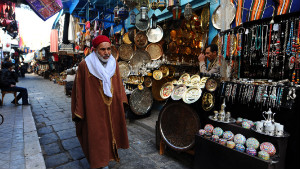Tunisia’s second attack in recent times has left the country reeling, and British tour operators pulling out for the next week, at least. This has been the biggest attack on and death of British people in a terrorist attack since the 7/7 bombings in London and the country has been rocked. But not as much as Tunisia itself will be rocked.
And here’s the problem. I know this because, if I could afford a holiday, no chance in hell would it be to an “Islamic” country, whether Tunisia, Egypt, Morocco, Dubai, and even Kenya would be off limits. The probabilities, however remote they may still be, are that much above anywhere in South America, Europe or Australasia, for example. If I’m thinking this, others are too, in their millions. We had friends due in Tunisia this week. They are now headed for Ibiza. 424,707 British nationals visited Tunisia in 2014. I cannot see that number being remotely reached this year. This means that the bottom will fall out of the Tunisian tourism market, and why a dive instructor at the beach asked to see the body of the gunman and spat on him. This is bad for Tunisia, financially. But the ramifications cut deeper. With a serious threat to financial viability, Tunisia, and other such countries who predominantly rely on tourism to keep competitive, will suffer in terms of poverty and inequality. Poverty is a rich breeding ground for extremism.
In other words, the events in Tunisia will, in the long run, play into the hands of the terrorists. They have won. The only way to beat the terrorists is to defy them and spend your money and time in Tunisia. But, empirically so, no one wants to do this. That is foolhardy. Euronews reports:
“The tourism sector in Tunisia has been killed, it’s dead now. Our economy is very bad, how we are going to live?” asked one Tunisian in Sousse.
“We depend on the tourists, there are around four thousand people from Sousse working in this sector.”
Tunisia’s tourism industry was already reeling from the Bardo museum massacre in Tunis, which happened earlier this year. Gunmen killed 21 foreign visitors.
Euronews reporter Mohammed Shaikhibrahim, who is in Sousse, said: “This area is known as a jewel of the Tunisian coast. It’s a favourite with tourists. But now the visitors have gone. All that is left here are traces of blood, left by the attack.”
CNN reports similarly:
“One of the main things you achieve when you hit tourist industries in countries like this that really depend upon tourism is that you are hitting the economy,” said Alexander Meleagrou-Hitchins from the International Centre for the Study of Radicalisation at King’s College London.
Meleagrou-Hitchins said the Tunisia attack would probably lead to a “massive reduction” in tourism.
“We have people relaxing on the beach on their holidays being murdered — that is not going to help the attempts by the Tunisian tourist industry to get people to come to the country. This can probably be seen as an attempt to destabilize the economy as well as the wider political situation in Tunisia,” he said.
Global market research firm Euromonitor International said tourism was of “vital importance” for Tunisia and had been growing.
“This growth however is highly dependent on the safety and stability in Tunisia. The recent outbursts of violence represent major threat for the country, which can escalate the political instability and security issues in this destination and ultimately keep travelers from visiting the country short to medium term,” senior travel analyst Nadejda Popova said.
“That said, there is an internal commitment to boosting the industry and therefore the authorities are likely to react and do whatever is possible to avoid any further issues,” she said….
With calm restored in recent years — despite security concerns from neighboring Libya and ongoing political tensions — those numbers have been on the rise, helped by costly advertising campaigns.
Recently reported statistics put visitor numbers still 10% lower than their pre-2011 levels, but numbers had been expected to rise again — particularly with a new “Star Wars” film renewing interest in the country’s role as a key location in the original movies.
In its annual Travel and Tourism Economic Impact report, the World Travel and Tourism Council had forecast visitor arrivals to reach 6,495,000 in 2015.In 2013, Tunisia’s tourism minister said 20% of the country’s population relied on the tourism industry.
The WTTC said travel and tourism had directly contributed 7.4% of GDP (U.S.$3 billion) in 2014, with its broader impact responsible for 15.2% of GDP.
Commenting after the June 26 attacks, WTTC President David Scowsill said: “It is important that travel organizations and travelers continue to support Tunisia, whilst the government takes appropriate measures on security.”
There is nothing positive to take from this. This threat to safety will have wide-reaching implications for the country, for neighbouring, similar countries of the Mahgreb, and this will only play into the hands of the Islamic fundamentalists.
The geo-political landscape of the world is rapidly changing. What do we do about it?
RELATED POSTS

